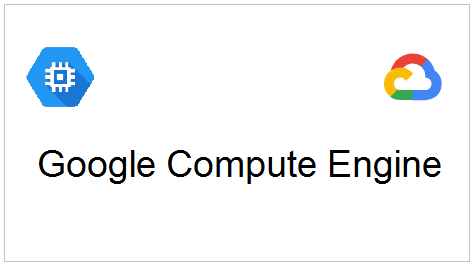Google Compute Engine Introduction and Features
Google Compute Engine (GCE) is the Infrastructure as a Service (IaaS) component of Google Cloud Platform (GCP). This is the same infrastructure on which Google’s search engine, Gmail, Youtube and other services are running. Google Compute Engine enables users to create and launch High-Performance and Scalable Virtual Machines (VMs).
Google Compute Engine Features
- Infrastructure as a Service (IaaS)
Compute Engine is an Infrastructure as a Service (IaaS) offering that allows clients to run workloads on Google’s physical hardware.
- Predefined and Custom Machine Types
Compute Engine offers predefined virtual machine configurations from micro instances to instances with up to 160 vCPUs and 3.75 TB of memory.
You can also use custom machine types which allows you to create compute engine virtual machines with optimal amounts of vCPU and memory which is right for your workloads. Going by this option you can realize significant savings in terms of cost.
- Storage – Persistent Disks and Local SSD
You can attach network storage up to 64 TB to your compute engine VMs as persistent disks. You can create persistent disks in HDD and Standard SSD formats. Please note if you terminate your VM instance, its persistent disk can retain data still and can be attached to another instance.
Unlike standard persistent disks, the local SSDs are physically attached to the server that is hosting your VM instance and it offers very high input/output operations per second (IOPS) and very low latency when compared to persistent disks. Local SSD sizes up to 3 TB are available for VMs.
- Robust Networking Features
VPC network sometimes just called as “network” is a virtual version of a physical network, like a data center network. It provides connectivity for your Compute Engine VM instances, Kubernetes Engine Clusters etc., and other resources in your project.
- Industry Leading Performance
It offers industry-leading local SSD performance. You can compare network throughputs on equivalent IaaS offerings in the market. Network throughput scales at 2 GB per vCPU and maximum throughput of 16 GB or 8 vCPU.
- Machine Rightsizing
When you create a new instance, Recommendation Engine provide recommendations for the new instance right after 24 hours, the instance has been created. If you change the machine type of an instance, Compute Engine will provide any further recommendations within 24 hours after the change/resize.
- Global Load Balancing
Google load balancing technology supports worldwide auto scaling and load balancing, which helps to distribute incoming requests to pool of instances across multiple regions to achieve maximum performance, throughput and availability at low cost.
- Storing and Retrieving Instance Metadata
Compute engine VM instances stores its meta data on a meta data server. You can query metadata of the instance like instance’s host name, instance ID, startup and shutdown scripts, service account information etc., from metadata server without any additional authorization.
- Setting Instance Availability Policies
GCE does regular maintenance of its infrastructure. During these maintenance activities, you can set instance availability options to configure the behavior of your VM instances. For example you can choose to live migrate your running instances from current host to another host or choose to terminate your instances instead.
You can set the following availability policies for your instances: Live migrate, Terminate & (optionally) restart and Automatic restart. The default behavior of your instance during maintenance is to live migrate, but you can change the behavior if you want.
- Running Startup and Shutdown Scripts
You can create and run your own startup scripts on your compute engine VMs to perform automated tasks every time your instance boots up
You can also create and run shutdown scripts, that runs before an instance is terminated or restarted.
- Linux and Windows Support
You can run OS of your choice, including Debian, CentOS, CoreOS, SUSE, Ubuntu, Red Hat Enterprise Linux, FreeBSD, or Windows Server 2008 R2, 2012 R2, and 2016.
- Preemptible VMs to support Batch Processing
You can choose preemptible VMs which are highly affordable, short-lived compute engine instances suitable mainly for batch jobs and fault-tolerant workloads.
Preemptible VM instances are similar to other machine types except that it might be terminated at any time. And it last for up to 24 hours. You won’t be charged if the preemptible instance is terminated witin 10 minutes after creation.
- Google Kubernetes Engine – Containers
You can run, manage and orchestrate Docker containers on compute engine VMs using Google Kubernetes Engine. Kubernetes Engine is the reliable, efficient and secured way to run Kubernetes Clusters used for deploying containerized applications.
- Per-Second Billing
Google bills you in second-level increments. And you pay only for the compute time that you use.
- Sustained & Committed Use Discounts
Google offers sustained use discounts which are automatic discounts that you get for running specific Compute Engine resources like predefined machine types, custom machine types, sole-tenant nodes, GPU devices etc., based on the usage level of the billing month.
When you purchase a committed use contract, then you can save up to 57% for most machine types or custom machine types.
Further Learning
- Cloud Interconnect is a direct, private connection for extending corporate network to Google Cloud
- Compute Resources for VMware vSphere Cloud Infrastructure
- GCP Virtual Private Cloud (VPC) Networks Fundamentals

